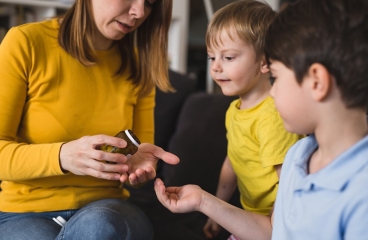
Overview
Iron deficiency anemia means that your child doesn't have enough iron in their blood. Your child may not get enough iron from food. Or maybe your child's body can't absorb iron well. Another cause is blood loss. This could be from things like bleeding in the stomach or bowel.
It's important to follow your doctor's plan. Treatment may take time. Without treatment, this condition can lead to problems with brain development.
Anemia gets worse slowly. You may not notice it right away. Your child may look more pale than usual. They may feel weak and tired.
Your doctor may need to do tests to find and treat the problem. Your child may need blood tests to make sure that the iron level goes back to normal.
Follow-up care is a key part of your child's treatment and safety. Be sure to make and go to all appointments, and call your doctor if your child is having problems. It's also a good idea to know your child's test results and keep a list of the medicines your child takes.
How can you care for your child at home?
- If your doctor recommended iron pills for your child, give them as directed.
- Try to give the pills on an empty stomach about 1 hour before or 2 hours after meals. But your child may need to take iron with food to avoid an upset stomach.
- Do not give your child antacids or let your child drink milk or caffeine drinks (such as coffee, tea, or cola) at the same time or within 2 hours of the time that your child takes iron pills. They can keep the body from absorbing the iron well.
- Vitamin C may help the body absorb iron. If your doctor recommends that your child take vitamin C (ascorbic acid), you may want to give iron pills with a glass of orange juice or some other food high in vitamin C.
- Iron pills may cause stomach problems, such as heartburn, nausea, diarrhea, constipation, and cramps. Be sure your child drinks plenty of fluids. Include fruits, vegetables, and fiber in your child's diet each day. Iron pills can change the color of your child's stool to a greenish or grayish black. This is normal. But internal bleeding can also cause dark stool, so be sure to mention any color changes to your doctor.
- Call your doctor if you think your child is having a problem with the iron pills. Even after your child starts feeling better, it will take several months for the body to build up its supply of iron.
- If your child misses taking a pill on time, do not give a double dose of iron.
- Keep iron pills out of the reach of small children. An overdose of iron can be very dangerous.
- Have your child eat foods rich in iron. These include red meat, poultry, eggs, beans, raisins, whole-grain bread, fortified cereals, and leafy green vegetables.
- Do not give your child nonsteroidal anti-inflammatory pain relievers, such as aspirin, naproxen (Aleve), or ibuprofen (Advil, Motrin), unless your doctor tells you to.
- Liquid forms of iron can stain your child's teeth. You can mix a dose of liquid iron in water, fruit juice, or tomato juice. Then let your child drink it with a straw so that it doesn't get on the teeth.
When should you call for help?
Call 911 anytime you think your child may need emergency care. For example, call if:
- Your child passes out (loses consciousness).
- Your child has severe shortness of breath.
Call your doctor now or seek immediate medical care if:
- Your child has new or increased shortness of breath.
- Your child is dizzy or lightheaded, or feels about to faint.
- Your child has new or worse nausea and vomiting.
- Your child's fatigue and weakness continue or get worse.
- Your child has any abnormal bleeding, such as:
- Nosebleeds.
- Bloody or black stools or rectal bleeding.
- Bloody or pink urine.
Watch closely for changes in your child's health, and be sure to contact your doctor if:
- Your child does not get better as expected.
Where can you learn more?
Go to http://www.healthwise.net/patientEd
Enter W421 in the search box to learn more about "Iron Deficiency Anemia in Children: Care Instructions".
Current as of: December 13, 2023
Author: Ignite Healthwise, LLC Staff
Clinical Review Board
All Healthwise education is reviewed by a team that includes physicians, nurses, advanced practitioners, registered dieticians, and other healthcare professionals.

